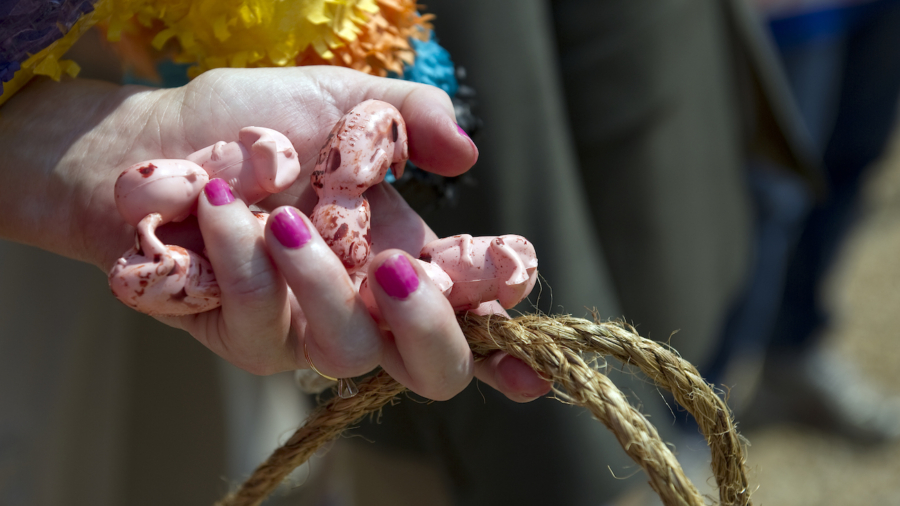A West Virginia judge on July 18 temporarily blocked the state’s pre-Roe abortion ban from taking effect.
The preliminary injunction issued by Kanawha County Circuit Judge Tera Salango came in a lawsuit filed in June on behalf of Women’s Health Center of West Virginia, the state’s only abortion clinic.
The clinic had suspended abortions and consultations out of fear of prosecution under the state’s 150-year-old abortion ban, after the Supreme Court overturned Roe v. Wade on June 24. The lawsuit challenges the law, seeking to block it from ever taking effect.
The 1973 Roe v. Wade decision had prohibited states from banning abortions prior to when the fetus is deemed “viable”—or potentially able to live outside its mother’s womb—deemed at around the second trimester of pregnancy at 24 weeks.
Roe had largely enabled abortions up until 24 weeks across the country for up to five decades, overturning state laws that had been in place prior to 1973, such as that of West Virginia’s.
Katie Quiñonez, the executive director of Women’s Health Center of West Virginia, said in a statement on July 18 that the latest decision by the Circuit Court of Kanawha County means the clinic can operate again for now.
She likened abortion to “essential health care,” adding, “The impacts of abortion being pushed out of reach for the last month have been devastating.”
West Virginia Attorney General Patrick Morrisey, a Republican, said in a statement that the ruling is “a dark day” for the state.
“We will appeal this decision to the Supreme Court of Appeals as soon as legally possible,” he said. “As a strong pro-life advocate, I am committed to protecting unborn babies to the fullest extent possible under the law, and I will not rest until this injunction is lifted. The current law on the books calls for the protection of life.”
The lawsuit is one of several that abortion providers and advocates who think the procedure is a right have filed across the United States seeking to prevent or hold off bans and restrictions in mostly Republican-led states after the fall of Roe.

Arguments
The state’s abortion ban from the 1800s makes it a felony to perform or have an abortion, except in cases deemed necessary to protect the mother’s life.
The West Virginia Attorney General’s Office argued that the ban is still enforceable and should take effect again.
But attorneys for the Women’s Health Center of West Virginia said the pre-Roe abortion ban has been superseded by modern laws, such as West Virginia’s 2015 law, which blocks abortion from 20 weeks onward.
Salango agreed with the plaintiffs and said the recently enacted state laws “hopelessly conflict with the criminal abortion ban.” As such, it would be “inequitable” to allow conflicting laws to be enforced.
“The code is replete with examples of undeniable conflicts in the law that appear fundamental and irreconcilable, making the law incompatible by any reading,” Salango said of the pre-Roe abortion ban. “Perhaps when it was drafted, that legislation was sufficient. However, in today’s world, it is simply too vague to be applied.”
“It simply does not matter if you are pro-choice or pro-life,” she added. “Every citizen in this state has a right to clearly know the laws under which they are expected to live.”
The Attorney General’s Office maintained that the new laws do not conflict with the pre-Roe ban but were instead intended to “fill the void regarding unregulated post-Roe abortion.” The office also noted that if lawmakers had wanted to repeal the pre-Roe ban, they would have done so.
They also said that the pre-Roe ban was only inactive for decades because of Roe, which had made it illegal to prosecute people for getting or performing abortions. But since Roe has now been overturned, that’s no longer the case.
Salango said that lawmakers should have taken more action if they wanted to make sure that abortion would have more penalties following Roe’s repeal.
“I will not put words in the Legislature’s mouth,” she said. “However, if the Legislature intended for the [pre-Roe abortion ban] to be in full force, it was free to pass a trigger law, similar to a number of other states. The Legislature chose not to do so.”
Salango’s ruling came hours after a Louisiana judge extended a temporary block on the state from enforcing a “trigger” abortion ban.
“Trigger” laws were designed so that abortion would be automatically stopped or severely limited immediately after Roe’s overturn. Twelve other states have similar laws.
The Associated Press and Reuters contributed to this report.
From The Epoch Times

